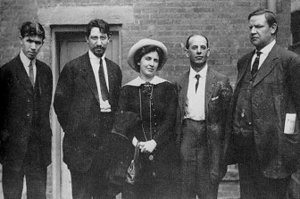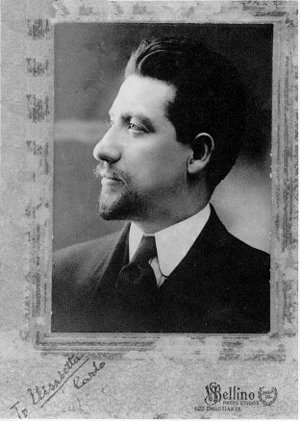Still working to recover. Please don't edit quite yet.
Difference between revisions of "Carlo Tresca"
m (name sort) |
|||
| (4 intermediate revisions by 2 users not shown) | |||
| Line 1: | Line 1: | ||
| − | '''Carlo Tresca''' ([[ | + | [[Image:Carlo-tresca-1910.jpg|thumb|right]] |
| + | '''Carlo Tresca''' ([[1879]] - [[january 11]], [[1943]] [[New York City]]) was an [[Italy|Italian]]-born [[United States|American]] [[Anarchism|anarchist]], newspaper editor, and [[Labor movement|labor agitator]]. | ||
| − | + | ==Labor organizer== | |
| + | He was active as the branch secretary of the Italian Railroad Workers' Federation and editor of the newspaper ''Il Germe''. Tresca moved to the United States in 1904, to escape a prison term for his radical political activities in Italy. He settled in [[Philadelphia]], where he became the editor of ''Il Proletario'', the official newspaper of the [[Italian Socialist Federation]] (ISF). Tresca helped shift the political orientation of the ISF to [[Syndicalism]]. | ||
| − | Tresca | + | ==Tresca and anarchism== |
| + | Tresca's political views became increasingly more radical and he soon came to identify himself as an anarchist. Tresca resigned as editor of ''Il Proletario'' and began publishing his own newspaper, ''La Plebe''. He would later transfer ''La Plebe'' to [[Pittsburgh, Pennsylvania|Pittsburgh]] and, with it, revolutionary ideas to Italian [[mining|miners]] and mill workers in Western [[Pennsylvania]]. | ||
| − | [[Category: | + | Tresca joined the [[Industrial Workers of the World]] (IWW) in 1912, when he was invited by the union to [[Lawrence, Massachusetts]] to help mobilize the Italian workers during a campaign to free [[Strike action|strike]] leaders [[Joseph Ettor]] and [[Arturo Giovannitti]], who were in prison on false murder charges. After the victorious strike in Lawrence, Tresca was active in several strikes across the United States; the [[Little Falls, New York]] textile workers' strike (1912), the [[New York City]] hotel workers' strike (1913), the [[Paterson silk strike of 1913|Paterson silk strike]] (1913), and the [[Mesabi Range]], [[Minnesota]], miners' strike (1916). |
| + | |||
| + | ==Opposition to fascism, Stalinism, and the Mafia== | ||
| + | [[Image:Paterson strike leaders.jpg|thumb|right|300px|1913 photo of [[Paterson silk strike of 1913|Paterson silk strike]] leaders [[Patrick Quinlan (activist)|Patrick Quinlan]], Tresca, [[Elizabeth Gurley Flynn]], [[Adolph Lessig]], and [[Bill Haywood]]]]Tresca became a major figure among Italian-Americans in trying to halt [[Benito Mussolini]]'s attempts to organize Italian immigrants into [[Fascism|Fascist]] [[support group]]s. At this time, Tresca was editing an [[Anti-fascism|anti-Fascist]] newspaper named ''Il Martello'', where he blasted Mussolini as a [[Class conflict|class enemy]] and [[traitor]] (the latter accusation made reference to the socialist roots of Fascism). Tresca's activities were being monitored in [[Rome]], while, in the United States, he was under heavy surveillance from the American government. In 1926, Fascists attempted to assassinate Tresca with a bomb during a rally. He was part of the defense committee for accused murderers [[Sacco and Vanzetti]], and frequently spoke in their defense at rallies and in articles. | ||
| + | |||
| + | During the 1930s, Tresca became an outspoken opponent of Soviet [[Communism|Communists]] and [[Stalinism]], particularly after the [[Soviet Union]] had engineered the destruction of the [[Anarchism in Spain|anarchist movement]] in [[Catalonia]] and [[Aragon]] during the [[Spanish Revolution]]. Prior to this, Tresca had supported the [[Bolsheviks]], reasoning that a [[Communist state]] was preferable to a [[capitalism|capitalist]] state, regarding Soviet Communists as allies in the fight against Fascism. | ||
| + | |||
| + | In early 1938 Tresca publicly accused the Soviets of [[kidnap]]ping [[Juliet Poyntz]] to prevent her defection from the [[Communist Party USA]] underground apparatus. Tresca alleged that, before she had disappeared, Poyntz had talked to him about her disgust over [[Joseph Stalin]]'s [[Great Purge|Great Terror]]. In 1941 Tresca, in a revealing moment, admitted to [[Max Eastman]] that [[Nicola Sacco]] was guilty of the crime with which he was charged, though [[Sacco and Vanzetti|Vanzetti]] was innocent. | ||
| + | |||
| + | In New York, Tresca also began a public campaign of criticism of the Mafia in his weekly newspaper, ''Il Martello''. Tresca appeared to be well aware of the risk he was running to his life. At the end of an article published shortly before his death, Tresca stated, "Morris Ernst, my attorney, knows all the facts. He knows that if an anti-fascist is assaulted or killed, the instigator is Generose Pope" (this is believed to be a reference to Generoso Pope Sr., a New York political power broker with ties to mobster [[Frank Costello]], whose Italian-American newspaper interests included the ''Corriere d'America'' and the daily ''Il Progresso Italo-Americano''). | ||
| + | |||
| + | ==Assassination== | ||
| + | By 1943 Tresca, on parole at the time, was under police surveillance. On January 9, 1943, his surveillance team witnessed an incident in which a speeding car attempted to run Tresca over. | ||
| + | |||
| + | Two days later, Tresca was leaving his parole officer's offices when he dodged surveilling officers by jumping into a car that was waiting for him. Two hours later, Tresca was crossing Fifth Avenue on foot when a black Ford pulled up beside him. A short, squat gunman in a brown coat jumped out and shot Tresca in the back and head with a handgun, killing him instantly. The black Ford was later found abandoned nearby with all four doors open. It was widely believed at the time that Mafia enforcer [[Carmine Galante]] was the suspected assassin, acting on orders from [[Vito Genovese]], who was at the time intent on gaining Mussolini's favor by eliminating a long-time enemy. | ||
| + | |||
| + | Others have theorized that Tresca was eliminated by the [[NKVD]] as retribution for criticism of the Stalin regime of the Soviet Union. | ||
| + | |||
| + | ==See also== | ||
| + | *[[Industrial Workers of the World]] | ||
| + | |||
| + | ==External links== | ||
| + | *[http://www.findarticles.com/p/articles/mi_m1316/is_n10_v20/ai_6809764 Review of ''All the Right Enemies: The Life and Murder of Carlo Tresca'' from Washington Monthly] | ||
| + | {{Wikipedia}} | ||
| + | |||
| + | {{DEFAULTSORT:Tresca, Carlo}} | ||
| + | [[Category:Italian anarchists]] | ||
| + | [[Category:Murdered anarchists]] | ||
[[Category:Anti-fascists]] | [[Category:Anti-fascists]] | ||
[[Category:Anti-Marxists]] | [[Category:Anti-Marxists]] | ||
| + | [[Category:Industrial Workers of the World members]] | ||
| + | |||
| + | [[it:Carlo Tresca]] | ||
Latest revision as of 22:56, 15 March 2010
Carlo Tresca (1879 - january 11, 1943 New York City) was an Italian-born American anarchist, newspaper editor, and labor agitator.
Contents
Labor organizer[edit]
He was active as the branch secretary of the Italian Railroad Workers' Federation and editor of the newspaper Il Germe. Tresca moved to the United States in 1904, to escape a prison term for his radical political activities in Italy. He settled in Philadelphia, where he became the editor of Il Proletario, the official newspaper of the Italian Socialist Federation (ISF). Tresca helped shift the political orientation of the ISF to Syndicalism.
Tresca and anarchism[edit]
Tresca's political views became increasingly more radical and he soon came to identify himself as an anarchist. Tresca resigned as editor of Il Proletario and began publishing his own newspaper, La Plebe. He would later transfer La Plebe to Pittsburgh and, with it, revolutionary ideas to Italian miners and mill workers in Western Pennsylvania.
Tresca joined the Industrial Workers of the World (IWW) in 1912, when he was invited by the union to Lawrence, Massachusetts to help mobilize the Italian workers during a campaign to free strike leaders Joseph Ettor and Arturo Giovannitti, who were in prison on false murder charges. After the victorious strike in Lawrence, Tresca was active in several strikes across the United States; the Little Falls, New York textile workers' strike (1912), the New York City hotel workers' strike (1913), the Paterson silk strike (1913), and the Mesabi Range, Minnesota, miners' strike (1916).
Opposition to fascism, Stalinism, and the Mafia[edit]

During the 1930s, Tresca became an outspoken opponent of Soviet Communists and Stalinism, particularly after the Soviet Union had engineered the destruction of the anarchist movement in Catalonia and Aragon during the Spanish Revolution. Prior to this, Tresca had supported the Bolsheviks, reasoning that a Communist state was preferable to a capitalist state, regarding Soviet Communists as allies in the fight against Fascism.
In early 1938 Tresca publicly accused the Soviets of kidnapping Juliet Poyntz to prevent her defection from the Communist Party USA underground apparatus. Tresca alleged that, before she had disappeared, Poyntz had talked to him about her disgust over Joseph Stalin's Great Terror. In 1941 Tresca, in a revealing moment, admitted to Max Eastman that Nicola Sacco was guilty of the crime with which he was charged, though Vanzetti was innocent.
In New York, Tresca also began a public campaign of criticism of the Mafia in his weekly newspaper, Il Martello. Tresca appeared to be well aware of the risk he was running to his life. At the end of an article published shortly before his death, Tresca stated, "Morris Ernst, my attorney, knows all the facts. He knows that if an anti-fascist is assaulted or killed, the instigator is Generose Pope" (this is believed to be a reference to Generoso Pope Sr., a New York political power broker with ties to mobster Frank Costello, whose Italian-American newspaper interests included the Corriere d'America and the daily Il Progresso Italo-Americano).
Assassination[edit]
By 1943 Tresca, on parole at the time, was under police surveillance. On January 9, 1943, his surveillance team witnessed an incident in which a speeding car attempted to run Tresca over.
Two days later, Tresca was leaving his parole officer's offices when he dodged surveilling officers by jumping into a car that was waiting for him. Two hours later, Tresca was crossing Fifth Avenue on foot when a black Ford pulled up beside him. A short, squat gunman in a brown coat jumped out and shot Tresca in the back and head with a handgun, killing him instantly. The black Ford was later found abandoned nearby with all four doors open. It was widely believed at the time that Mafia enforcer Carmine Galante was the suspected assassin, acting on orders from Vito Genovese, who was at the time intent on gaining Mussolini's favor by eliminating a long-time enemy.
Others have theorized that Tresca was eliminated by the NKVD as retribution for criticism of the Stalin regime of the Soviet Union.
See also[edit]
External links[edit]
| This article contains content from Wikipedia. Current versions of the GNU FDL article Carlo Tresca on WP may contain information useful to the improvement of this article | WP |
